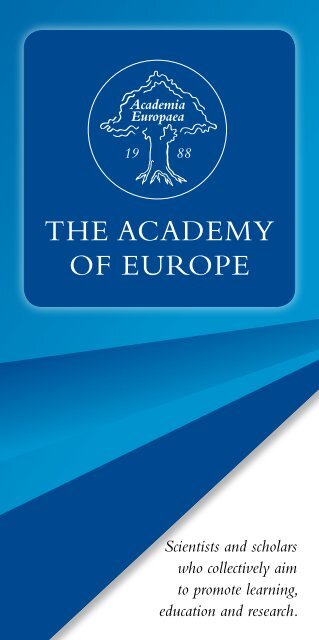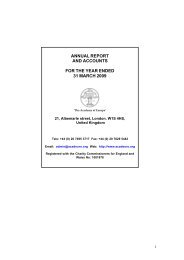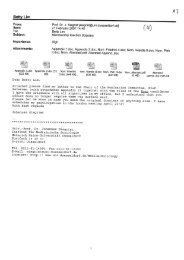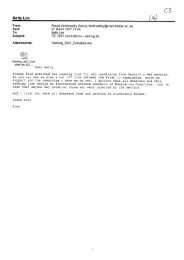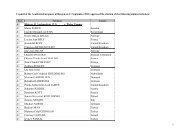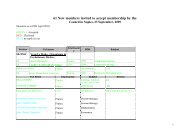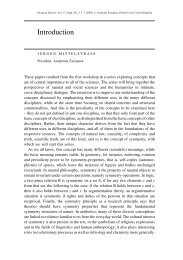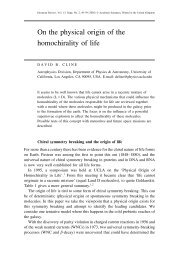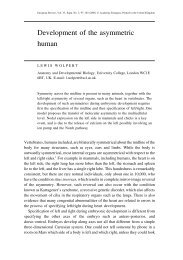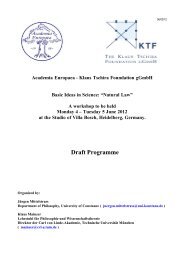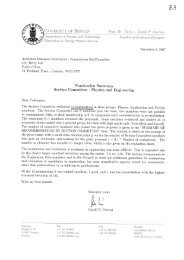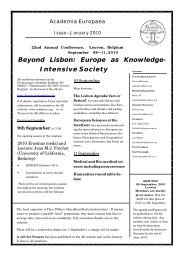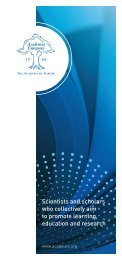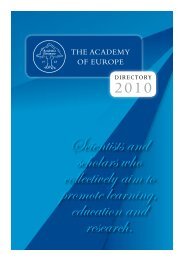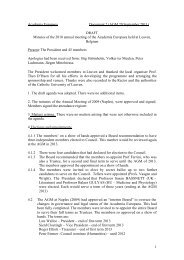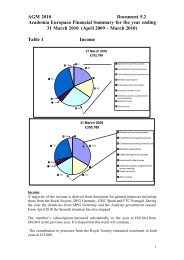ThE AcAdEmy oF EuropE - Academia Europaea
ThE AcAdEmy oF EuropE - Academia Europaea
ThE AcAdEmy oF EuropE - Academia Europaea
You also want an ePaper? Increase the reach of your titles
YUMPU automatically turns print PDFs into web optimized ePapers that Google loves.
<strong>Academia</strong><br />
<strong>Europaea</strong><br />
The Academy<br />
of Europe<br />
Scientists and scholars<br />
who collectively aim<br />
to promote learning,<br />
education and research.
<strong>Academia</strong> <strong>Europaea</strong> was founded<br />
in 1988 as an international, nongovernmental<br />
association of<br />
individual scientists and scholars<br />
from all disciplines, who are<br />
experts and leaders in their own<br />
subject areas as recognised by<br />
their peers.<br />
The <strong>Academia</strong> <strong>Europaea</strong> will:<br />
• Seek to promote a wider appreciation of the value of<br />
European scholarship and of research.<br />
• Seek to encourage interdisciplinary and international<br />
scholarship in all areas of learning of relevance to Europe.<br />
• Identify topics of trans-European importance to science and<br />
scholarship, and propose appropriate action to ensure that<br />
any such topics are adequately addressed.<br />
• Shall, where appropriate to its expertise, provide<br />
independent and impartial advice to European institutions,<br />
governments and international agencies concerning matters<br />
affecting science, scholarship and academic life in Europe.<br />
The <strong>Academia</strong> will endeavour to:<br />
• Encourage achievement of the highest possible standards in<br />
scholarship, research and education.<br />
• Promote a better understanding among the public at large of<br />
the benefits of knowledge and learning, and of scientific and<br />
scholarly issues that affect society, its quality of life and its<br />
standards of living.<br />
We achieve these aims through a programme of activities<br />
which include the organisation and promotion of plenary<br />
meetings, study groups, expert workshops; through the<br />
election of eminent scientists and scholars to membership of<br />
the <strong>Academia</strong>; and through scientific and other publications,<br />
including the <strong>Academia</strong>’s quarterly journal, the European<br />
Review.
The<br />
Academy<br />
of Europe<br />
Membership<br />
The <strong>Academia</strong> has three membership categories: Ordinary,<br />
Foreign and Honorary.<br />
The <strong>Academia</strong>’s current membership is about 2300. There are<br />
over 67 foreign members, normally prominent European<br />
scholars who are resident outside of Europe. Membership is<br />
always open to the best scientists and scholars. The <strong>Academia</strong><br />
particularly welcomes nominations for women members and<br />
for candidates who are under 55 years of age, from all<br />
disciplines.<br />
The method of election of new members is based on a<br />
nomination by existing members. Any member of the<br />
<strong>Academia</strong> may nominate a new member from any discipline or<br />
any country. Nominations are then considered in the following<br />
stages:<br />
• First, by the appropriate Section committee. All members of<br />
the <strong>Academia</strong> are included in one of seventeen<br />
multidisciplinary Sections. Each Section has a chairperson<br />
and committee.<br />
• Second, nominations are peer reviewed by the Section<br />
committees who pass on their recommendations for<br />
consideration by the Council’s Nominations Subcommittee.<br />
• Finally the Council elects new members, based on the<br />
recommendations of the Nominations Subcommittee.<br />
Newly elected members are then invited to accept the<br />
honour of membership of the <strong>Academia</strong>.
Activities<br />
Annual Scientific Meetings<br />
The principal meeting is the Annual conference. In recent<br />
years these have been thematic, multidisciplinary meetings of<br />
three days held at a European location. Many of the papers<br />
presented at the Annual Meetings are subsequently published<br />
in the European Review.<br />
The Erasmus Lecture and Medal<br />
The Erasmus Lecture and award of a medal were introduced<br />
into the programme of the Annual Meeting in 1992 to provide<br />
an opportunity for <strong>Academia</strong> members and others to hear a<br />
renowned scholar. The Erasmus lecturers have included: Janos<br />
Kornai, Ernst Mestmäcker, Lawrence Freedman, Alain Touraine,<br />
Hubert Markl, Paul Crutzen, Peter Burke, Raoul van<br />
Caenegem, Kristof Glamann, Edoardo Boncinelli, Georgio<br />
Bernardi, Harold Kroto, Carl Djerassi, Stig Strömholm, Pierre<br />
Léna, Bert Sakmann, Francisco Márquez Villaneuva and Semir<br />
Zeki.<br />
The Burgen Scholars<br />
In order to recognise the contribution to learning of younger<br />
scientists and scholars, the <strong>Academia</strong> appoints ‘Burgen Scholars’<br />
at its Annual Meeting. The Scholars, named after the<br />
<strong>Academia</strong>’s Founding President, are outstanding younger<br />
academics from the host country; they are invited to participate<br />
fully in the Annual Meeting and present summaries of their<br />
work.<br />
The Gold Medal<br />
The <strong>Academia</strong>’s Gold Medal is awarded to institutions or<br />
individuals who through their inspiration, political efforts,<br />
managerial skill, or financial means have supported European<br />
science and scholarship. The Medal has been awarded to the<br />
Royal Society of London, Heinz Riesenhuber, George Soros,<br />
Paul Sacher, Jacques Delors, Klaus Tschira, The Max Planck<br />
Society , the Deutsche Forschungsgemeinschaft, The<br />
Riksbankens Jubileumsfond and the Wenner Gren Foundations.
Symposia and working groups<br />
The <strong>Academia</strong> <strong>Europaea</strong> also organises special working groups<br />
and workshops to address particular topics of scientific or<br />
academic interest. Ideas can originate from within and through<br />
the Sections. For example recent workshops on the Earth<br />
Sciences “Topo-Europe: Topological Geosciences” and in the<br />
Medical sciences on “Brain Plasticity” and on “Reactive<br />
Oxygen Species in Health and Disease”. Also on<br />
‘Linguistics’, on ‘Islamic Art’ and on ‘Medieval Music’, from the<br />
Humanities sections. The other major themes of particular<br />
importance have been initiatives that respond to Higher<br />
Education issues and Culture, through our Higher Education,<br />
Research and Culture in European Society group known as<br />
the ‘HERCULES’ group. Symposia and volumes are on topics<br />
such as: the Impact of Information Technology on society,<br />
“Higher education in the 21st century”, “Teaching science to<br />
children”, “Interdisciplinarity and the organisation of<br />
knowledge in Europe”, “The impact of electronic publishing<br />
on the academic community” and “Electronic communication<br />
and research in Europe”, “Collaboration and ownership in the<br />
digital economy” and “Virtuality in Europe”, The “University<br />
in the Market”, “The Formative Years of Scholars” and<br />
“Excellence in Institutions of Higher Education in Europe”.<br />
European Policy relevant initiatives are organised such as a<br />
series exploring the “Role of the Humanities in the European<br />
Research Area” and “The future of Mathematics Education in<br />
Europe”. For all of these, external sponsorship is sought to<br />
conduct these workshops and related publication activities. All<br />
details and information is available on the <strong>Academia</strong> website at<br />
www.acadeuro.org<br />
Prizes schemes<br />
Since 1993 the <strong>Academia</strong> has organised a scheme for giving<br />
prize awards to young scientists from the republics of the<br />
former Soviet Union. Significant financial support for this<br />
scheme has been given by a number of European and<br />
international foundations, societies, Russian companies and<br />
individuals. New sponsors are always welcome. The scheme has<br />
helped to promote further support of young scientists within<br />
these countries.
Publications<br />
The <strong>Academia</strong> issues a quarterly journal, the European Review,<br />
published by Cambridge University Press, which is distributed<br />
to all members and is also available from CUP on private and<br />
institutional subscription. The European Review includes high<br />
quality papers, of an interdisciplinary character. Many editions<br />
also include a specific ‘Focus’ features consisting of several<br />
related articles on a topic of European concern. Abstracts can<br />
be viewed online at: http://journals.cambridge.org/journal_<br />
europeanreview<br />
The <strong>Academia</strong> increasingly uses the web as a main channel for<br />
communication. Hard copy material is produced, including<br />
bulletins mailed out with the European Review, made available<br />
online and to members in hard copy on request. An annual<br />
Directory is also published, along with the annual report and<br />
accounts. Sponsorship and advertising is possible in all of these<br />
channels of communication.<br />
A number of workshops and study groups have been published<br />
as <strong>Academia</strong> papers and in several cases as books, including the<br />
following:<br />
• The Responsibility of the Scientist to Science and Society,<br />
papers and discussion from an <strong>Academia</strong> <strong>Europaea</strong><br />
symposium, London, June 1989. Published in Science and<br />
Public Policy vol 17, no. 2, April 1990.<br />
• Research on the Human Genome in Europe, Report of the<br />
<strong>Academia</strong> <strong>Europaea</strong> commissioned by Bundesministerium<br />
für Forschung und Technologie on behalf of the European<br />
Science Ministers Conference, March 1991.<br />
• Space Research in Europe, Report of a symposium<br />
organised jointly by the <strong>Academia</strong> <strong>Europaea</strong> and the<br />
Académie des Sciences, ISBN 1-874117-01-2, September<br />
1991.<br />
• Linguistic Unity and Linguistic Diversity in Europe, Report<br />
on an <strong>Academia</strong> <strong>Europaea</strong> symposium, ISBN 1-874117-02-<br />
0, 1991.<br />
• Academies, Research Councils and Universities: Their role<br />
in modern Europe by Chris Caswill, report of a workshop<br />
organised by <strong>Academia</strong> <strong>Europaea</strong>, ISBN 1-874117-04-7,<br />
1992.<br />
• Schooling in Modern European Society, Edited by T. Husén,
A. Tuijnman & W.D. Halls. A report of the <strong>Academia</strong><br />
<strong>Europaea</strong>, Pergamon Press, ISBN 0-08-041393-5, 1992.<br />
• Psychosocial Disorders in Young People: Time Trends and<br />
their Causes, Edited by M. Rutter and D. Smith. Published<br />
by J. Wiley, ISBN 0-471-95054-8, 1995.<br />
• Goals and Purposes of Higher Education in the 21st<br />
Century, Edited by Arnold Burgen. Published by Jessica<br />
Kingsley, ISBN 1-85302-547-X, 1995 (for Spanish edition,<br />
see “Metas y Proyectos ...”, 1999).<br />
• Inside <strong>Academia</strong>, New Challenges for the Academic<br />
Profession, Edited by Peter A.M. Maassen and Frans van<br />
Vught, Center for Higher Education Policy Studies,<br />
Enschede. Published by De Tijdstroom, Utrecht, ISBN<br />
90-352-1800-0, 1996.<br />
• The Idea of Progress, Edited by Jürgen Mittelstrass, Peter<br />
McLaughlin and Arnold Burgen. Published by Walter de<br />
Gruyter, ISBN 3-11-015393-9, 1997.<br />
• Growing up with Science, Edited by Kjell Härnqvist and<br />
Arnold Burgen. Published by Jessica Kingsley, ISBN<br />
1-85302-449-X, 1997.<br />
• <strong>Academia</strong> <strong>Europaea</strong> Opinion: Opinion on the Commission’s<br />
proposal for a European directive on the legal protection of<br />
biotechnological inventions. February 1997.<br />
• The Impact of Electronic Publishing on the Academic<br />
Community, Edited by Ian Butterworth, Pubished by<br />
Portland Press, ISBN 1-85578-122-0, 1998. – HERCULES<br />
group<br />
• <strong>Academia</strong> <strong>Europaea</strong> Briefing Paper - Proposed European<br />
Directive on the Harmonisation of Certain Aspects of<br />
copyright COM (97) 628 final - November 1998<br />
• Interdisciplinarity and the Organisation of Knowledge in<br />
Europe, Edited by Richard Cunningham. Published by the<br />
European Commission, ISBN 92-828-6175-9, 1999.<br />
• Electronic Communication and Research in Europe, Edited<br />
by Jack Meadows and Heinz-Dieter Böcker. Published by<br />
the European Commission, ISBN 92-828-6874-5, 1999.<br />
• Metas y Proyectos de la Educación Superior, Spanish edition
of “Goals and Purposes of Higher Education in the 21st<br />
Century”. Published by Fundación Universidad-Empresa,<br />
ISBN 84-7842-178-5, 1999.<br />
• The Social Impacts of Virtual Information, recommendations<br />
from the Paderborn conference, The Tree Issue 15, 2000.<br />
• The need for High Bandwidth Computer Based<br />
Networking in Europe. A joint statement with the<br />
European Science Foundation, Number 7, February 2000.<br />
• Science and Higher Education in Croatia. A report on a visit<br />
by the <strong>Academia</strong> <strong>Europaea</strong>, June 2000.<br />
• The Virtual University, Edited by Henk van der Molen,<br />
Published by Portland Press, ISBN 1-85578-145-X, 2001. –<br />
HERCULES group<br />
• “Collaboration and Ownership in the Digital Economy -<br />
CODE”, Edited by Michael Century, Published by MIT<br />
Press (in press - 2003).<br />
• CODE – synopsis of the conference and forward look.<br />
Edited by J. Howkins. Published by the Arts Council of<br />
England and The <strong>Academia</strong> <strong>Europaea</strong>. ISBN 0-7287-0896-5.<br />
2002<br />
• “Clues to Excellence in Higher Education”. Rapporteurs<br />
report. (Lanzendorf, U. & Verburgh, A.) 2002 [w]<br />
• Excellence in Higher Education. Edited by Erik de Corte.<br />
Published by The Portland Press, London. ISBN 1-85578-<br />
152. 2003-10-01 – HERCULES group<br />
• “The Formative Years of Scholars”. Edited by Ulrich<br />
Teichler. Published by The Portland Press. London, 2006<br />
ISBN-13 978 1 85578 164 1 – HERCULES grop<br />
• “Quality Assessment of Higher Education in Europe”.<br />
Edited by Alessandro Cavalli. Published by The Portland<br />
Press. London, 2007 ISBN 978 1 855781719 –<br />
HERCULES group<br />
• “The University in the Market”. Edited by Lars Engwall<br />
and Denis Weaire. Published by the Portland Press, London,<br />
2008 ISBN 978 85578 168 9 – HERCULES group
Independent advice<br />
One of the principles underlying the foundation of the<br />
<strong>Academia</strong> was the perceived need for impartial expert<br />
independent advice to public and private bodies. The <strong>Academia</strong><br />
considers that with a membership of 2300 eminent scientists<br />
and scholars from many disciplines and cultures, able to<br />
comment independently of any national or organisational<br />
viewpoint, it is well placed to offer advice on scientific or<br />
academic matters to appropriate bodies in Europe.<br />
The following are examples of policy advice provided by the<br />
<strong>Academia</strong> <strong>Europaea</strong>:<br />
• The <strong>Academia</strong> was invited by the Conference of European<br />
Science Ministers to advise on research into the human<br />
genome, at a time when many of the implications of this<br />
type of research, and the scale of the task, were poorly<br />
understood. The <strong>Academia</strong> created an international expert<br />
group whose report was presented to European ministers<br />
and helped to clarify some of these issues at a high level.<br />
• The <strong>Academia</strong> was invited by the State Committee of the<br />
Ukraine for Science and Technology to conduct an<br />
evaluation of the quality of science in the Ukraine, and to<br />
advise on the reorganisation of the country’s science and<br />
research.<br />
• Advice has been given to the European Parliament and<br />
Commission on proposed directives on the patenting of<br />
biological inventions and on the harmonisation of copyright.<br />
• At the invitation of the Parliament of Croatia, the <strong>Academia</strong><br />
has provided an assessment on Science and Higher<br />
Education in Croatia. In a wider regional context the<br />
<strong>Academia</strong> in collaboration with UNESCO, has been a lead<br />
player in activities aimed at the rebuilding of scientific<br />
co-operation in the countries of South East Europe.<br />
• The <strong>Academia</strong> have issued a number statements to the<br />
institutions and governments of the European Union which<br />
identify priorities for action. These include:<br />
• 2002: “Virtuality and the European Citizen”<br />
• 2002: “The need for a European Research Council”<br />
• 2002: “International Academies as Interlocutors between<br />
International Scholarship and Supranational Policy”. In The
IPTS Report, vol 70. 2002. (Coates, D. & Strömholm,<br />
S.)<br />
• 2003: “Towards a European Research Council: A<br />
Further Contribution to the Debate”<br />
• 2003: The Rôle of Universities in the Europe of<br />
Knowledge<br />
• 2004: The Rôle of the Humanities in European<br />
Research Policy – a statement<br />
• 2007: The future of Mathematics Education in Europe.<br />
• The <strong>Academia</strong> <strong>Europaea</strong> was a founder member of the<br />
European Academies Science Advisory Council<br />
(EASAC) a grouping of major European National<br />
Academies of Science that in provide independent<br />
analyses of the impacts and implications of science on<br />
issues of significant European Public policy. EASAC<br />
responds to emerging and potential policy areas, such<br />
as on Energy, Environment, Health and the impact of<br />
emerging areas of science, for example the<br />
Nanosciences, by drawing on Academies own<br />
members to publish comprehensive analyses of the<br />
latest science that might be useful as a guide to policy<br />
making. Full information and publications can be<br />
found on the EASAC website at www.easac.eu<br />
Further information on all of these activities can be<br />
found on www.acadeuro.org
Relationships<br />
with other bodies<br />
The <strong>Academia</strong> <strong>Europaea</strong> maintains close relationships with<br />
other bodies concerned with European science and scholarship,<br />
including the European Commission and its scientific advisory<br />
body (EURAB), the European Science Foundation, UNESCO,<br />
the network of European Academies (ALLEA), the<br />
International Council for Science (ICSU) and Euroscience.<br />
Contacts and exchanges of information and literature are also<br />
maintained with national academies and other international<br />
academies such as the Third World Academy.<br />
Finance<br />
As an independent body, the <strong>Academia</strong> <strong>Europaea</strong> receives<br />
financial support from a wide range of sources, including from<br />
a number of government ministries and the research funding<br />
councils of several European countries, private foundations,<br />
charities, banks and industries. Members are also asked to pay a<br />
subscription, although to recognise that both national traditions<br />
and the great differentials across European country economies<br />
may present difficulties, generous exemptions are provided for<br />
in individual cases. All of our conferences and activities are<br />
externally supported by funds which are negotiated by the<br />
<strong>Academia</strong> and often passed directly from sponsors to the local<br />
organisers. This ensures an active and relevant involvement at<br />
the local and regional levels.
Organisation<br />
The <strong>Academia</strong> <strong>Europaea</strong> is led by a President, and up to three<br />
Vice-Presidents, an honorary Treasurer and an elected Council<br />
composed of the Section committee chairs and a number of<br />
independently elected members. The President, the Vice-<br />
Presidents and the Treasurer form a Board of management.<br />
Council Subcommittees handle specific areas of the <strong>Academia</strong>’s<br />
business. As a charitable trust, registered under UK trust law,<br />
the governance and overall legal responsibility for the affairs of<br />
the <strong>Academia</strong> lay with a Board of Trustees. These are all<br />
individuals of international standing, drawn from the worlds of<br />
<strong>Academia</strong>, the professions and public service.<br />
To improve co-ordination, each member of the <strong>Academia</strong> is<br />
placed into a discipline based Section: These include: History<br />
and Archaeology, Classics & Oriental Studies, Linguistic<br />
Studies, Literary & Theatrical Studies, Musicology (History of<br />
Art and Architecture, Philosophy, Theology and Religious<br />
Studies, Behavioural Science, Social Science, Mathematics,<br />
Informatics, Physics and Engineering Science, Chemical<br />
Sciences, Earth & Cosmic Sciences, Biochemistry and<br />
Molecular Biology, Cell Biology, Physiology & Medicine,<br />
Organismic and Evolutionary Biology. Sections are responsible<br />
for nomination of new members and for activities.
The <strong>Academia</strong>’s office and the<br />
secretariat are located in London, at:<br />
<strong>Academia</strong> <strong>Europaea</strong><br />
Fourth Floor,<br />
21, Albemarle Street,<br />
London. W1S 4BS<br />
Tel: +44 (0) 207 495 3717<br />
Fax: +44 (0) 207 629 5442<br />
Email: admin@acadeuro.org<br />
Website: www.acadeuro.org<br />
The <strong>Academia</strong> <strong>Europaea</strong> is a not-for-profit charity registered in England<br />
(registration number 1001978)


